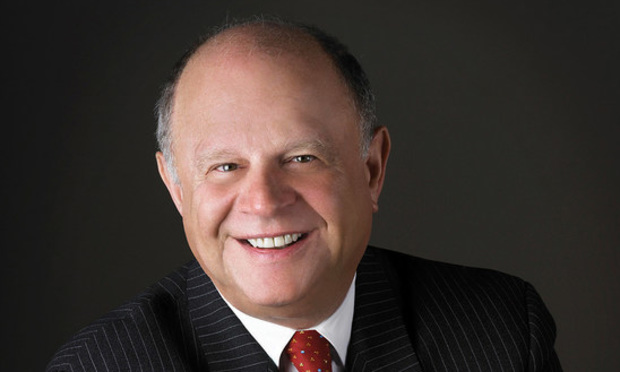Lifetime Achievement: Joel Katz
"While the model for music consumption changes, the client's concern is always the same. How do I get paid, who is paying me, and how do I ensure that I am not being cheated out of my fair share of the revenue?"
June 19, 2019 at 02:00 PM
5 minute read
 Joel Katz, Greenberg Traurig, Atlanta (Courtesy photo)
Joel Katz, Greenberg Traurig, Atlanta (Courtesy photo)
Joel Katz has a remarkable a story from his days in law school, long before he was a counselor to some of the biggest music stars in the business.
He told the The Atlanta Journal-Constitution in 2015 that his contracts professor, considered the toughest in the school, would fail anyone who was late three times to class. Katz was working the night shift at a hotel and was late twice—and on the third tardy incident, the professor said he could leave because he was going to fail.
“I told him that he can give me the F, but I was going to stay. I paid for this course and I was going to learn,” Katz said.
When the professor privately pressed Katz about his late night job, he told Katz he wouldn't fail because, “You want to be a lawyer more than anyone in the class.”
Katz eventually moved to Atlanta and opened up a practice. He got into the music business in 1971 when he negotiated a contract for James Brown, leading to a client list that has included B.B. King, Willie Nelson, Gregg Allman, Kix Brooks, Jimmy Buffett, Kenny Chesney, Ronnie Dunn, Jamie Foxx, Sammy Hagar, Steve Harvey, Faith Hill, the estate of Whitney Houston, Julio Iglesias, Alan Jackson, Kris Kristofferson, Little Big Town, Chris “Ludacris” Bridges, Tim McGraw, Brad Paisley, George Strait, James Taylor, Justin Timberlake and others.
When Billboard named Katz its 2017 Lawyer of the Year, it reported that Katz spends 10 hours a day on the phone and about half his time on the road. In 2016, that included trips to China, Russia and Gabon, in addition to the more obvious music hot spots of New York, Los Angeles and Nashville. He advised the Gabonese Republic on the African Music Institute's building with Boston's Berklee College of Music.
In addition to numerous new contracts for artists and executives, Katz negotiated a $600 million pact for the National Academy of Recording Arts and Sciences, a longtime client, to keep the Grammy Awards and other shows on CBS, according to Billboard.
In 2017, Katz negotiated and closed on behalf of Faith Hill and Tim McGraw six recording agreements with Sony Music.
You told the The Atlanta Journal-Constitution in 2015 that your lack of experience in entertainment law helped in your first representation of James Brown because no experienced lawyer would have felt comfortable communicating Brown's “loony” requests to a record company. The company agreed to many of Brown's requests during negotiations, but now that you are a veteran entertainment lawyer, how do you handle “loony” expectations clients ask of their record companies?
When I negotiated the infamous James Brown contract with Polydor, I had no entertainment industry experience. There was no way for me to know if Mr. Brown's requests were possible. I believe this was the primary reason Mr. Brown hired me. After 50 years of experience in this business, I know that managing expectations honestly is a crucial component of building a relationship with a client. We set achievable and measurable expectations that are proven to work when we negotiate on behalf of our clients.
What is a common misconception people have about the music business?
People believe the music business doesn't follow standard business practices. Since the music industry consists of creative individuals who earn money by creating and performing songs, people forget that there are professionals who assist these creative artists with their music careers (talent managers, business managers, entertainment lawyers, etc.). These professionals operate their businesses with tried-and-true and tested platforms.
You've represented musicians through the eras of vinyl, 8-track tapes, cassettes, compact discs, Napster, iTunes and streaming services. What are some of your clients' biggest concerns as the technology enabling their work to be distributed changes?
While the model for music consumption changes, the client's concern is always the same. How do I get paid, who is paying me, and how do I ensure that I am not being cheated out of my fair share of the revenue?
Your representation of music producer Dallas Austin veered far out of entertainment law when he was arrested in Dubai on drug charges. What did you learn in your successful efforts to secure a pardon and his release?
I learned that compassion and forgiveness have no boundaries—spanning cities and continents. Multiple ambassadors, a prime minister, a prince, a senator, religious leaders, entertainment figures and prominent private citizens all stepped out on a limb to help secure the release of Mr. Austin from a Dubai jail. The ruler of Dubai even pardoned him.
This content has been archived. It is available through our partners, LexisNexis® and Bloomberg Law.
To view this content, please continue to their sites.
Not a Lexis Subscriber?
Subscribe Now
Not a Bloomberg Law Subscriber?
Subscribe Now
NOT FOR REPRINT
© 2025 ALM Global, LLC, All Rights Reserved. Request academic re-use from www.copyright.com. All other uses, submit a request to [email protected]. For more information visit Asset & Logo Licensing.
You Might Like
View All
Atlanta-Based Fearless Fund Ends Black-Only Entrepreneurial Grant Contest After Settling Civil Rights Lawsuit

Deal Watch: Latham, Weil Lead Home Improvement Deal; Dealmakers Face Election Headwinds
8 minute read
JetBlue-Spirit Airlines Planned $3.8 Billion Merger Dropped Due to Antitrust Concerns

Deal Watch: Kirkland, Akin Drive Energy Deals as Big Law Leans Into Sector for M&A
7 minute readTrending Stories
- 1CFPB Labor Union Files Twin Lawsuits Seeking to Prevent Agency's Closure
- 2Crypto Crime Down, Hacks Up: Lawyers Warned of 2025 Security Shake-Up
- 3Atlanta Calling: National Law Firms Flock to a ‘Hotbed for Talented Lawyers’
- 4Privacy Suit Targets Education Department Over Disclosure of Student Financial Data to DOGE
- 5Colwell Law Group Founder Has Died in Skiing Accident
Who Got The Work
J. Brugh Lower of Gibbons has entered an appearance for industrial equipment supplier Devco Corporation in a pending trademark infringement lawsuit. The suit, accusing the defendant of selling knock-off Graco products, was filed Dec. 18 in New Jersey District Court by Rivkin Radler on behalf of Graco Inc. and Graco Minnesota. The case, assigned to U.S. District Judge Zahid N. Quraishi, is 3:24-cv-11294, Graco Inc. et al v. Devco Corporation.
Who Got The Work
Rebecca Maller-Stein and Kent A. Yalowitz of Arnold & Porter Kaye Scholer have entered their appearances for Hanaco Venture Capital and its executives, Lior Prosor and David Frankel, in a pending securities lawsuit. The action, filed on Dec. 24 in New York Southern District Court by Zell, Aron & Co. on behalf of Goldeneye Advisors, accuses the defendants of negligently and fraudulently managing the plaintiff's $1 million investment. The case, assigned to U.S. District Judge Vernon S. Broderick, is 1:24-cv-09918, Goldeneye Advisors, LLC v. Hanaco Venture Capital, Ltd. et al.
Who Got The Work
Attorneys from A&O Shearman has stepped in as defense counsel for Toronto-Dominion Bank and other defendants in a pending securities class action. The suit, filed Dec. 11 in New York Southern District Court by Bleichmar Fonti & Auld, accuses the defendants of concealing the bank's 'pervasive' deficiencies in regards to its compliance with the Bank Secrecy Act and the quality of its anti-money laundering controls. The case, assigned to U.S. District Judge Arun Subramanian, is 1:24-cv-09445, Gonzalez v. The Toronto-Dominion Bank et al.
Who Got The Work
Crown Castle International, a Pennsylvania company providing shared communications infrastructure, has turned to Luke D. Wolf of Gordon Rees Scully Mansukhani to fend off a pending breach-of-contract lawsuit. The court action, filed Nov. 25 in Michigan Eastern District Court by Hooper Hathaway PC on behalf of The Town Residences LLC, accuses Crown Castle of failing to transfer approximately $30,000 in utility payments from T-Mobile in breach of a roof-top lease and assignment agreement. The case, assigned to U.S. District Judge Susan K. Declercq, is 2:24-cv-13131, The Town Residences LLC v. T-Mobile US, Inc. et al.
Who Got The Work
Wilfred P. Coronato and Daniel M. Schwartz of McCarter & English have stepped in as defense counsel to Electrolux Home Products Inc. in a pending product liability lawsuit. The court action, filed Nov. 26 in New York Eastern District Court by Poulos Lopiccolo PC and Nagel Rice LLP on behalf of David Stern, alleges that the defendant's refrigerators’ drawers and shelving repeatedly break and fall apart within months after purchase. The case, assigned to U.S. District Judge Joan M. Azrack, is 2:24-cv-08204, Stern v. Electrolux Home Products, Inc.
Featured Firms
Law Offices of Gary Martin Hays & Associates, P.C.
(470) 294-1674
Law Offices of Mark E. Salomone
(857) 444-6468
Smith & Hassler
(713) 739-1250






